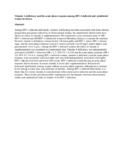Vitamin A deficiency and the acute phase response among HIV-1-infected and -uninfected women in Kenya

View/
Date
2002Author
Baeten, JM
McClelland, RS
Richardson, BA
Bankson, DD
Lavreys, L
Wener, MH
Overbaugh, J
Mandaliya, K
Ndinya-Achola, JO
Bwayo, JJ
Type
ArticleLanguage
enMetadata
Show full item recordAbstract
Among HIV-1-infected individuals, vitamin A deficiency has been associated with faster disease progression and greater infectivity in observational studies, but randomized clinical trials have shown no effect of vitamin A supplementation. We conducted a cross-sectional study of 400 HIV-1-infected and 200 HIV-1-uninfected women in Mombasa, Kenya to examine the relations between vitamin A deficiency (serum retinol <30 microg/dL) and HIV-1 status, HIV-1 disease stage, and the acute phase response (serum C-reactive protein >or=10 mg/L and/or alpha1-acid glycoprotein >or=1.2 g/L). Among the HIV-1-infected women, the effect of vitamin A supplementation was examined in a randomized trial. Vitamin A deficiency was independently associated with HIV-1 infection (OR = 2.7, 95% CI: 1.9-4.0) and the acute phase response (OR = 2.8, 95% CI: 1.9-4.1). Among HIV-1-infected women, vitamin A deficiency and the acute phase response were associated with each other and were both independently associated with higher HIV-1 plasma viral load and lower CD4 count. HIV-1-infected women having an acute phase response had no increase in serum vitamin A levels after supplementation. Serum levels increased significantly among women without an acute phase response, although not to normal levels among women who were deficient at baseline. Among HIV-1-infected individuals, it is likely that low serum vitamin A concentrations reflect more active infection and the acute phase response. These results provide possible explanations for the disparity between observational studies and randomized trials of vitamin A for HIV-1 infection
URI
http://hinari-gw.who.int/whalecomwww.ncbi.nlm.nih.gov/whalecom0/pubmed/12394804http://erepository.uonbi.ac.ke:8080/xmlui/handle/123456789/16716
Citation
J Acquir Immune Defic Syndr.2002 Oct 1;31(2):243-9Publisher
Department of Epidemiology, University of Washington, Seattle 98104-2499, USA Department of Medical Microbiology, University of Nairobi
Collections
- Faculty of Health Sciences (FHS) [10378]
